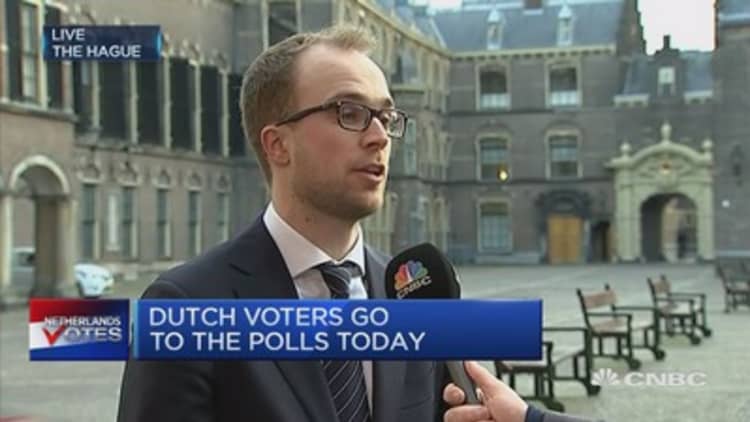Wednesday's Dutch election is an important one, widely dubbed by Europe-watchers as a litmus test for rising nationalist sentiment in Europe. But unlike the U.K. and the U.S., whose votes were partially fuelled by economic discontent, the Netherlands will be voting to preserve its economic fortunes, a Rabobank economist has told CNBC.
"Voters feel like they have a lot to lose," Jesse Groenewegen told CNBC Wednesday, shortly after polls opened.
"It's what we in economics call loss aversion: It's not what they stand to gain from any sort of government policies but what they stand to lose if things go the wrong way."

The Dutch economy has been growing fairly steadily in recent years, and, despite a slight dip towards the end of last year, looks set to achieve gross domestic product growth of approximately 2.1 percent in 2017, according to CPB Netherlands Bureau for Economic Policy Analysis.
This is ahead of the Organization for Economic Co-operation and Development's projections for the U.K. (1.6 percent), France (1.4 percent) Germany (1.8 percent), all of which are also managing recent and upcoming political votes.
Current polls suggest that incumbent Dutch Prime Minister Mark Rutte is ahead in the polls, indicating that voters may seek to retain the status quo with regards to economic policies. However, the rise of Geert Wilders' far-right Freedom Party also points to clear national identity concerns in the country, which are likely to play a significant role in the future government.
Drowning in milk and cheese
Despite these concerns, Groenewegen said the Netherlands would be unlikely to follow the U.K. in holding a referendum on its membership of the European Union, saying that such a vote would be detrimental to Dutch economic interest.
"Nexit could be very detrimental to the Dutch economy because the Dutch economy is a very open economy," said Groenewegen.
"It's the fifth largest exporter in the world. It's the second largest agriculture exporter in the world. One could say we would be drowning in milk and cheese if we weren't able to export our goods outside of our own borders."
He added that a lack of trade deal with the U.K. would also be detrimental to the Netherlands, which currently exports 8 percent of its goods to Britain.



